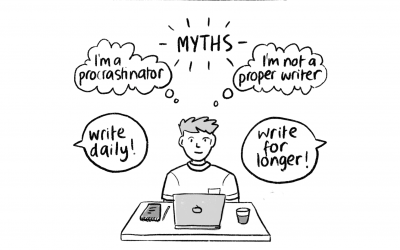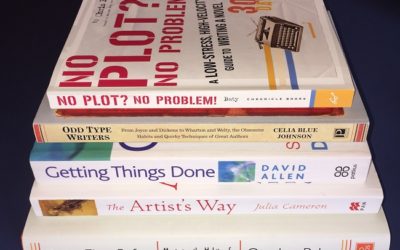While writing might be a solitary pursuit all writers can benefit from connection. Find out how to get accountability, support and solidarity from writing communities. Tap into some of the best free resources and get inspired to write with others.
Poet Emily Dickinson is the poster girl for reclusive writers. In 19th Century Massachusetts she famously retreated from society to write.
However, even the most solitary of writers can benefit from having a community and that was the case for Dickinson. Her letters reveal deep connections – not just to friends and family but to other writers who she relied upon for feedback and support, such as her “literary counselor and confidant” Thomas Wentworth Higginson.
“Writing can be a lonely business. Publishing can be a ruthlessly competitive one. Authorship is different: it is a fellowship and a community.” James McConnachie
I whooped with joy when James McConnachie from The Society of Authors said authorship is a fellowship and a community.
Writers get solace from those on the same journey and learn from those with more experience. Writing communities provide inspiration to get started and support as you continue. Some communities focus on creating a time and space to write with accountability to show up. Other groups offer safe spaces to share work, receive feedback and celebrate wins.
>> Read more: The complete guide to writing accountability – hold yourself to account and use others to help you achieve your writing goals
Dickinson’s approach is even more inspirational in lockdown – writing in her garret while reaching out to the world of letters beyond. So, fire up your fountain pen or switch on Zoom to connect with your fellow writers with these inspirational, and free, communities.
Find your writing community
Whether you are a novelist, an PhD student, writing for business or pleasure, there’s a community to help you.
Writing groups traditionally met in-person in local libraries, colleges or bookshop. Lockdown has made groups more accessible and technology has transformed our ability to connect across the world.
My first port of call is always the #WritingCommunity hashtag on Twitter or Instagram – a perfect place to ask questions. I’m particularly fond of #writerslift to shout out and support emerging writers.
Other groups have moved online, like Shut Up & Write! With over 65,000 writers worldwide this meetup provides accountability and social support. Many universities base their structured writing sessions on that model. The shift to online has increased participation, with many academic writers finding writing together online to be even more effective.
Daily accountability with the Writers’ Hour
The London Writers’ Salon was the quintessential literary salon, hosting events for writers in private members’ clubs in Soho. When the pandemic hit, they cancelled in-person events, but rather than wait for lockdown to ease they wrote it out – together.
Co-founders Parul and Matt often wrote together as writing buddies. They went public with their accountability practice and grew it into a thriving community, with up to 200 hundred writers joining them online every weekday morning for Writers’ Hour.
The structure is simple. Join the Zoom video call at 8am BST (cameras optional – it is very early for an audience!). After a warm welcome and inspirational quote from the co-hosts, everyone shares their goal for the session in the chat function and it’s down to work. There’s 50 minutes of focused writing time, then everyone comes back to comment how it went.
It’s a textbook pre-commitment strategy which removes the effort involved in trying to find time to write. Sign up, add it your calendar, get a nudge a few minutes before and show up to write.
>> Read more: Thinking of joining a writing group? Ask yourself these 8 questions first
They’ve now expanded to accommodate US time zones and added extra accountability practices through their membership scheme with a goal setting workshop at the beginning of the month, Wednesday watercooler chats and ‘Ship It Hour’ celebrations on a Friday. And they still run an awesome event series – all online.
Sprints, retreats and summer camp
If you’re after a push for your writing, here at Prolifiko we run free 7-day writing sprints to kickstart your writing routine.
Writing under pressure not only supercharges productivity, but forges deep bonds between those signed up for the challenge. For example, I’ve signed up for a paid writing retreat with Alison Jones to help me blast my next non-fiction book.
The mother of all challenges is National Novel Writing Month when each November, novelists aim to meet the audacious target of writing 50,000 words in 30 days. Over the past two decades the NaNoWriMo community has grown to be one of the most active and supportive for novelists. It’s also incredibly effective – their data shows that writers are ‘three times more likely to finish a novel with a buddy.’
>> Read more: A beginner’s guide to entering NaNoWriMo
Every April and July NaNoWriMo offers a summer camp for writers to set their own goals and gather in virtual cabins and around the camp fire. This more relaxed approach is perfect to make progress on your personal projects while also joining their global community with daily writing challenges, virtual write-ins, and word sprints on Twitter. You can keep track of your progress online, get support from camp counsellors and celebrate hitting your Camp NaNoWriMo goal with badges and goodies from their online shop.
“One of the most important things that recent times have shown us is the power of community. The people in your community share resources and information; they cheer you up when you’re feeling down; they always have your back; and they hold you accountable to help you reach your goals.” NaNoWriMo
Celebrating writing communities
The collective noun for writers is called a worship, a reverence rightly due to the wonderful work writers do.
Together writers are stronger.
Collaboration and a spot of friendly competition can help everyone raise their game. I learnt that first-hand running the writers’ retreat centre for Arvon. Each week a fresh group of writers arrived as strangers, by the time I gave the closing night speech they were a collective.
Whatever you write, there’s a community to help you.




